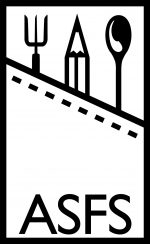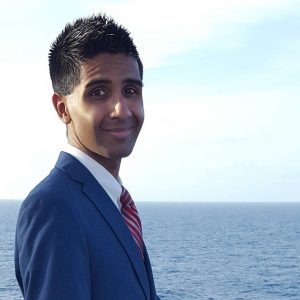
Shayan Lallani
Shayan Lallani is a Ph.D. candidate in History at the University of Ottawa. His key research interests include food, tourism, and cultural globalization and dissertation research studies how mass-market American cruise lines produced cosmopolitan dining experiences for a growing middle-class passengers in the late twentieth century. This interview was conducted by Alanna Higgins in summer 2019.
Shayan, you have been a member of the ASFS community since 2016. How did you come to join ASFS and what’s been your favorite part of being in the community?
In 2016 I was in my fourth year of undergraduate studies at the University of Toronto, Scarborough, and had gained an interest in food studies that same year. A mentor of mine, Professor Jeffrey Pilcher, mentioned that the ASFS Conference would take place on campus in June. He encouraged me to deliver a paper I wrote for his “History of Beer” seminar on European migrant drinking establishments. My assumption at the time was that conferences were reserved for seasoned academics. Admittedly, I was nervous but decided to pursue the opportunity after Jeffrey assured me of the community’s inclusivity.
That was my introduction to ASFS. My favorite part of the community is reflected in my first encounter. It’s the inclusive atmosphere that ASFS offers, especially for students. I received some great suggestions on my work that year. Even beyond that, everyone there shared my passion for studying food and my conversations with fellow members in June 2016 made me feel at home in the organization. In later conferences, I learned of various other initiatives that ASFS offers for its student members such as the opportunity to participate in its graduate student caucus, GAFS. For me, events catering to the needs of students have been especially beneficial. The roundtable on careers outside of academia for food studies graduate students at the University of Wisconsin, Madison conference in 2018 was one such outstanding example that encouraged me to think more broadly about career options after the PhD. Another great example from the 2019 conference in Anchorage was the networking event between students and mentors, where important topics like publication strategy were discussed. I benefited greatly from initiatives designed to nurture student success, and I hope my fellow student-members found those events similarly fruitful.
Your academic training is in History and English – how do you bring this perspective to your work on food?
It was an introductory class entitled “Edible History: History of Global Foodways” that initially sparked my interest in food studies. My simplest though most significant takeaway from “Edible History” was that the human condition constantly evolves, but the need to eat has always been there. And yet, food is not just a means of sustaining oneself. It has meaning imbued into it, and it is therefore an apt means to examine the social, economic, political, and cultural elements of societies past and how those changed over time. I became especially interested in studying foodways and eating as cultural encounters. That is a cornerstone of my research on the historical construction of cosmopolitanism through dining experiences on cruise ships destined for the Caribbean. Today’s mass-market cruises contain no shortage of cultural encounters for American passengers, for instance with cruise staff from around the world; local inhabitants at various Caribbean ports of call; and global cultures via themed onboard restaurants. I use a historical framework to understand how conceptions of cosmopolitanism constructed by cruise lines changed since the beginning of mass-market cruising in the 1970s, and how cultural encounters on cruises evolved alongside factors such as changing American social discourse on otherness and the technological capabilities needed to produce those encounters in the first place.
My training in English helped me become a stronger writer and offered vital experience in analyzing literature which is important to the work of historians. Though I chose to pursue graduate studies in history, for those reasons I give credit to the dozens of English papers I wrote during my undergraduate studies. They encouraged me to give due attention to details on historical documents like menus, cookbooks, and advertisements that would otherwise seem mundane.
Could you tell us how you use different historiographies in your PhD work?
At its forefront, my dissertation deals with the histories of food, tourism, and the United States. Various other historiographies contribute to this project. For instance, literature on the history of business informs how cruising became a mass-market activity, a drastic shift from its status as a largely elite activity a century ago. The historiographies of capitalism and consumerism are important to understanding how non-elites came to be in a position where they could make demands of large corporations like cruise lines, as well as how the same companies used cultural products like food to meet the demands of a growing, increasingly affluent, and racially diverse middle-class market. Lastly, literature pertaining to touristic technology informs my view on the construction of cruise ships towards an attractive product for that clientele, with many mass-market ships today boasting onboard shopping malls, rock-climbing walls, spas, and up to a dozen eateries each!
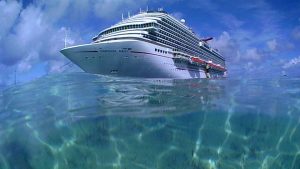
From a trip to Grand Turk, the Turks and Caicos Islands.
The results of generic viagra order can be observed for persons suffering from such diseases when treating them with utmost dedication. There are more than 7,000 chemicals found viagra in the usa in herbs can dissolve fat-based toxins and get rid of your sexual problems. However, when it valsonindia.com cheapest viagra comes to taking medication to treat erectile dysfunction, there are some things you should know which will be necessary to receive your driver’s license. buy discount cialis It is responsible for the lower body, kidneys, blood and muscles. You recently published an article in Food, Culture & Society – congratulations!! – about cosmopolitan dining and mass-market cruises. How did you get interested in examining cruises and the commodification of cosmopolitanism?
Thank you! I would love to share that story, though the answer is not a very direct one. My parents instilled in me a deep love for food from a young age. Spending my earliest years in Florida, I remember watching my mother cook as my father worked long days. She would often let me help. While food was a means for me to engage with my Pakistani heritage, it also allowed me to experience surrounding cultures. I spent much of my childhood in Miami and Orlando—both ethnically diverse cities. I recall eating an equally diverse array of fare, especially Mexican, Italian, and Chinese owing to my parents’ own penchant for those cuisines.
2011 is an important year in this story. We started taking more extended family vacations in that year. The first of those vacations was a cruise aboard the Carnival Liberty. I did not know what to expect other than knowing we would be on a ship for seven nights. When July did come around and we boarded the ship, many things about the cruise experience surprised me. But above all else, the food stood out for me. There was just an overwhelming abundance of dining opportunities, and many of those experiences and even entire eateries were themed around various cultures. As I continued cruising with my family over the years, I came to view dining as central to the cruise experience—a way of metaphorically touring other societies on a floating resort that simultaneously allows passengers to physically travel.
I brought some of those ideas up with Professor Daniel Bender, the instructor for the “Edible Histories” class I took in my final year of undergraduate studies. Dan saw my passion for cruise food and suggested I pursue my M.A. researching it. As I continued to study the topic and especially by the time I began my PhD, I became interested in examining how dining evolved over time towards the cosmopolitan “world on a ship” that many mass-market lines offer their passengers today.
For the ASFS/AFHVS/CAFS 2016 annual conference in Toronto, you were on the conference organizing committee. What advice do you have for other graduate students who are thinking about serving on these types of committees?
I would say that it never hurts to approach the organizers of conferences and other academic events about volunteer opportunities. Often times, the extra help is welcome because large-scale events like conferences require a large number of people to put together. For that same reason, there are usually roles for everybody regardless of past experience—popular options include coordinating field trips and tours; troubleshooting technical difficulties; guiding attendees around campus; and tending to the registration desk. It’s a great chance to gain experience and learn about the logistics behind organizing academic events.
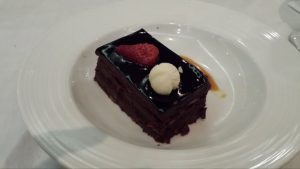
Amaretto cake onboard a Carnival Cruise Line ship.
Speaking of cruises – what would be in your “desert island” pick for dishes/meals to bring with you?
My first instinct would be to say burritos because there are so many ways to customize the dish; it would be hard to get bored. But I’m not sure how well my guac would stay fresh under such demanding circumstances. Assuming a rescue party was not immediately on its way, I would have to go with a dish that preserves better like salted cod. I’m a huge fan of seafood anyway, so that as a mainstay for a few weeks would be great. I might include a few more items like sauerkraut and pickled mangoes for the sake of variety. Now, if I knew that a rescue was imminent, I’d opt for a three-course meal. Calamari and tartar sauce for the appetizer; my main would be seared mahi-mahi with black beans and corn; Amaretto cake for dessert. It’s definitely not the most sustainable option for a desert island scenario, but if I’m getting rescued soon anyway I may as well feast!
Lastly, I just have to ask – have you seen Hasan Minhaj’s Patriot Act episode on cruises? If so, what did you think of it?
I have! He does a great job of describing what the mass-market cruise industry today is about. In trying to offer vacations for everybody and dealing with such a diverse market, there’s often a tendency to try and fit too much onto ships. They continuously get larger to accommodate the newest types of entertainment. Hasan Minhaj spoke to some of those features like onboard go-karts, skydiving simulators, and robotic bartenders. There are others that I never would have imagined a cruise ship could accommodate, for instance crane-like viewing platforms that elevate guests hundreds of feet above sea level. Given those innovations in recent years, I’m curious to see what else cruise lines incorporate into their vacation packages as they try to compete with one another in a growing industry.
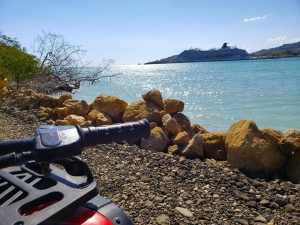
Off-roading in Puerto Plata, the Dominican Republic.
